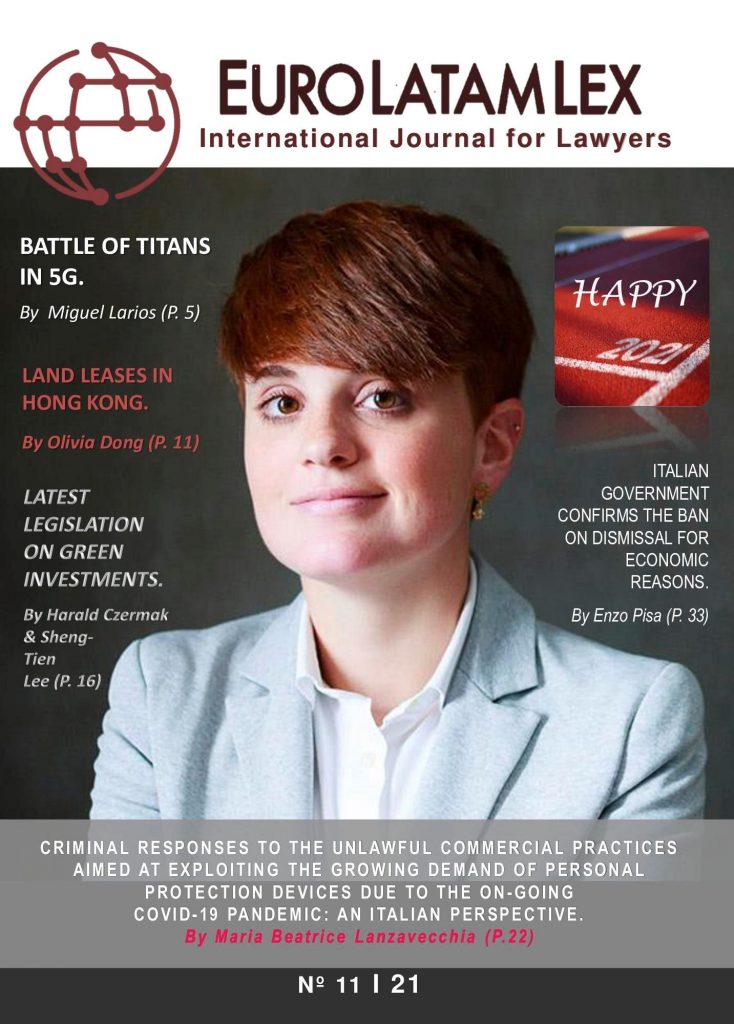Maria Beatrice Lanzavecchia – (EuroLatamLex International Journal for Lawyers, January 2021)
Criminal responses to unlawful commercial practices aimed at exploiting the growing demand of personal protection devices due to the on-going Covid-19 pandemic: an Italian perspective.
Unfortunately, there is very little room for debate when discussing what has been the most relevant feature of this past year, with the Covid-19 pandemic brutally imposing itself over any other possible contestant.
Besides its dramatic effects on public health, the Covid-19 pandemic has also had a devastating impact on global economy. Certain areas of business have been pushed to the verge of collapse by the strict restrictions imposed by most governments to try and contain the circulation of the disease (to name some, all industries related to tourism, travel or live entertainment). Other businesses on the contrary, have experienced unprecedented revenues due to the very same situation (first and foremost, all industries related to e-commerce, delivery services and, of course, pharmaceutical and healthcare products).
Particularly in the earliest phases of the pandemic -which in Italy, one of the first countries to be deeply impacted by Covid-19, date back to March-April 2020- the demand for products such as face-masks, disinfectants, hand sanitizers and disposable gloves -driven by the ever growing fear of contracting the disease- skyrocketed, getting so high that most of these goods became virtually impossible to find both in retail and wholesale distribution, to the point that even hospitals, nursing homes and clinics faced major shortages.
Faced with such a dramatic situation, many businessmen tried their best to help the population and the struggling healthcare system, not only by offering financial aid, but also by swiftly converting their manufacturing facilities to the production of those medical devices that were most needed to deal with the pandemic; on the contrary, others showed much less empathy to the on-going global emergency and went quite too far in trying to take advantage of the circumstances.
From March onwards the Italian Financial Police has been continuously monitoring the market in order to prevent unlawful commercial practices, many of which were put in place on the web with the involvement of companies based outside of the EU.
Based on a review of the press releases published by the Italian Financial Police over the last ten months, such unlawful commercial practices included: i) sale of personal protection devices (mainly face-masks and hand sanitizers) that carried no EC label (or a counterfeited EC label) and had not been authorized by the Italian Health Ministry; ii) marketing of unlicensed medical products that were advertised as effective treatment/prevention options for Covid-19; iii) marketing of unlicensed self-diagnosis kits for Covid-19; iv) sale of personal protection devices (mainly face-masks and hand sanitizers) with price increments reaching up to 6.000% of their original value.
All abovementioned practices were equally aimed at exploiting the growing fear of the population in a time of unprecedented distress, and therefore raised great concern in the public opinion.
Nonetheless, despite public disapproval, some of those practices have proved to be particularly difficult to sanction in a strictly criminal perspective.
While misrepresenting the characteristics of a product to increase its market value and selling (or trying to sell) a product that is objectively inadequate to fulfil the specific purpose for which it is marketed clearly fall within the definition of a number of well known criminal offences aimed at protecting consumers and other market participants against fraudulent behaviours (mainly: fraud or fraud in commercial activities, which also entails the criminal liability of the legal entity as per Law 231/2001), the situation -at least in the Italian criminal system- is much less straightforward when it comes to rising the price of certain goods in order to benefit from their increasing demand.
In order to find an effective way to repress the behaviour of those who were selling personal protection devices at enormously inflated prices, some Inquiring Authorities brushed up a very peculiar criminal offence that had been first introduced in the 70’s to mitigate the effects of the oil crisis and that -until last spring- had found very little application in practice: the crime of speculative practices on goods, as provided by art. 501bis of the Italian Criminal Code.
This particular criminal offence sanctions those who -in their commercial or industrial activities- speculate on essential goods in a way that can increase their price or reduce their availability on the internal market; when compared to the specific case described above, there is no doubt that both face-masks and hand sanitizers can indeed be considered as “essential goods”, at least given the current circumstances, yet Courts have been assuming divergent positions around the concept of “internal market”.
As a matter of fact, as of now all the cases that have been brought before criminal courts (mainly due to appeals against preliminary measures such as the seizure of the goods or of the website through which the goods were advertised and sold) only concerned the behaviour of small businesses, whose speculation could hardly be considered as posing an actual threat to price levels both locally and nationwide.
As anticipated, so far the judicial decisions on the matter have been quite hesitant (with some Courts -including that of Milan- leaning towards a much stricter approach than others), but it will certainly be very interesting to see if (and how) the many effects of Covid-19 will also include a revamp of art. 501bis.

